Civil Liberties, Habeas Corpus, Human Rights, Military Tribunal, Political Prisoner, Surveillance, Torture, War Resister
Podcast: Play in new window | Download
Updates:
- Bradley Manning Update: Michael Ratner – We Have A Secret Trial Going On Right Now
- Park Slope Food Co-op Vote
- Len Weinglass Remembrance
—-
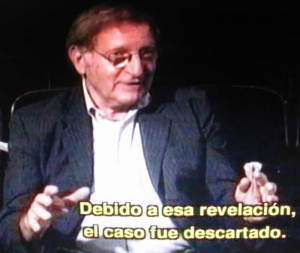
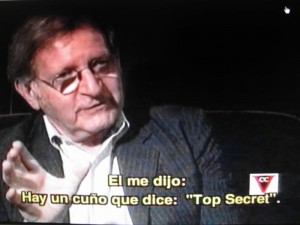
Leonard Weinglass TV Interview: Cuba 2004
We hear excerpts of an interview with attorney Leonard Weinglass and Miguel Alvarez, adviser on international and political affairs to Ricardo Alarcon, president of Cuba’s National Assembly. In this interview Len Weinglass discusses his early career representing the first African-American mayor of Newark, New Jersey, Daniel Ellsberg and the Pentagon Paper, plus crucial turning points that shaped his life story as a people’s lawyer.
———
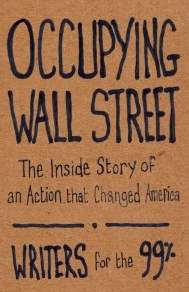
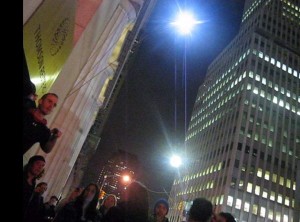
Occupying Wall Street: The Inside Story Of An Action That Changed America – Writers For The 99%
A collective of writers for the 99 percent have created a very interesting new book for OR Books, distributed by Haymarket Books. They’ve employed a unique writing method to chronicle the many details within the movement of Occupying Wall Street. A team of nearly 60 writers with rotating membership, collaborated on the describing the intricate structures and daily life of the movement such as running the general assembly, how the security and medical center operate and then the stories of the activists involved.
Colin Robinson:
- We were supportive of what was going on down in Zuccotti and I thought we should do a book about this too.
- Beginning of October I went down to the trash cans outside my apartment and pulled an old Budweiser carton out of the trash and cut it into the shape of a book cover and wrote on it with a Sharpie, “Occupying Wall Street, By Writers With the 99%.
- I photographed it with my iPhone at home, and sent it out with a press release, and New York Magazine picked it up saying Occupy Wall Street has a book and it then went everywhere.
- The journalists were calling me up saying, who are the writers for the 99 percent?
- So then I had to get some volunteers. We went down to Zuccotti and talked to some of the facilitators down there. They said you should just come to a General Assembly and we’ll put it on the agenda.
- Tell the GA about the book, get some volunteers and you’ll be fine.
- So we went down on a Wednesday night, in early October. I was not feeling comfortable about this.
- I was a little nervous about speaking at the GA to try and get permission to publish the book.
- They suggested to go to and Education and Empowerment Meeting Committee at 60 Wall Street and take it up there and ask for volunteers there.
- The following week we went the meeting and the response at that point was not very encouraging.
- People were suspicious of who we were. Whether this book was going to be seen as the official book of Occupy Wall Street, which we were saying it wasn’t but they thought it would be. And that it was going to develop an analysis that they didn’t agree with.
- No, we were saying its going to be descriptive, it’s not analytical. A lot of the twinkling was out flat, some of it was down. In the end, some guy stood up in the back and said I don’t think we should support this.
- We got blocked, he crossed his arms in front of chest. If this goes through, I’m walking out. We felt really wounded by it.
- But afterward some people from the committee came up and said we feel badly about the way you were treated, we’ll volunteer to help. We started meeting weekly at 60 Wall Street and the meetings got bigger and bigger.
- We came up with a structure, chapter by chapter. There were 2 themes in the book, one was a chronological account of the action. The day the occupation started on September 17.
- The drilling down of the daily detail for what life is like in the square. We’ve got sections in the book of how the kitchen worked, how the library worked, how the general assembly worked.
- I thought at first, what I would do would be to interview the people who are volunteering to write, pick the ones who could write well, and as kindly as possible tell the ones who couldn’t write they couldn’t be part of it.
- I soon realized that was not is the spirit of Occupy Wall Street.
- We were trying to reproduce the book in a way that reflected the values of Occupy Wall Street that meant it was produced in a very democratic, horizontal fashion. Anyone who wanted to participate could.
- We came up with a chapter structure, we sent people out into the square and we did about 200 interviews in the square. We allocated the interviews to each chapter and we tried to find 3 or 4 people to write each chapter.
- The whole book was written by 60 people in 2 weeks. This book absorbed the ethos of Occupy Wall Street.
- If you repress a little bit of it, its going to spring up somewhere else.
Guest – Colin Robinson, former Publisher, Verso Press and The New Press, and Scribner senior editor; John Oakes, former Grove Press Editor and founder of 4 Walls, 8 Windows and ORBooks. He’s written for magazines and newspapers including the New York Times and the London Guardian.
——————————————————
Civil Liberties, Habeas Corpus, Human Rights, Surveillance, Targeting Muslims, Torture, Truth to Power
Podcast: Play in new window | Download
Updates:
——

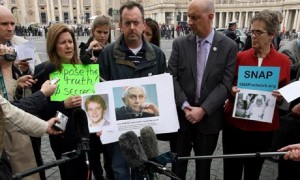
Church Puts Legal Pressure on Abuse Victims’ Group
Earlier last year, we reported on the Vatican revising its laws making it easier to discipline sex abuser priests. This month, lawyers for the Roman Catholic Church and priests accused of sexual abuse and pedophilia have used the courts to force the group SNAP Survivors Network of those Abused by Priests to disclose more than two decades of e-mails that could include correspondence with victims, lawyers, whistle-blowers, witnesses, the police, prosecutors and journalists. A Kansas City judge decided SNAP must comply with lawyers because it had relevant information regarding 2 cases in Missouri.
Attorney Barbara Blaine:
- As you know we are a not for profit, self help support group run by and for people who have been victims of clergy sexual abuse. We have been providing support information to each other since 1988.
- The church officials have taken an unprecedented move and they have subpoenaed records from our SNAP leaders.
- We are an international group, we have groups forming in other countries as well.
- Here in the United States, we have support groups meeting in about 70 cities. In these support groups people share their feelings and tidbits of information on how to cope with the repercussions of sexual violence.
- There are subpoenas from 2 different cities, 2 different cases, both from the state of Missouri.
- In Kansas City, what’s happen in the past year, is a lot of sex abuse by priests has been uncovered, exposed and brought to light. In the process, the Bishop himself was indicted for failure to protect children.
- In one particular civil case, the church attorneys have subpoenaed the records of our national director and they are looking for very extreme information.
- These subpoenas are not tailored to be helpful to get information for the case, SNAP is not a party to either of these cases. They ask for records with no date, from the very beginning of SNAP, from 1988.
- They’re asking for all the information in our emails, in our files, and they’re looking for any information that names any priest from the diocese of Kansas City, St Joseph.
- We do believe that the victims who have spoken out in Kansas City, have had an impact. I think its empowered other victims to come forward. I think they’re trying to shut down SNAP in Kansas City.
- The biggest concern we have now is the fear that this is spreading. In many ways, the intended effect has already taken place.
- I started SNAP, I did so, after I was raped and sexually violated by a priest in my parish growing up.
- Stop The Legal Bullying Petition.
Guest – Attorney Barbara Blaine, founder of SNAP the nation’s oldest and largest self-help organization for victims of clergy sexual abuse 10 thousand survivors.
——–
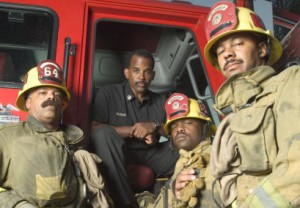
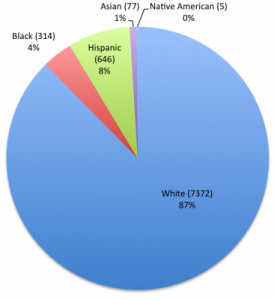
Court Rules FDNY Liable for Up to $128 Million in Back Pay to Black and Latino Applicants
Last week, a US District judge awarded plaintiffs back pay in a class action lawsuit that found the New York Fire Department to have racially discriminatory hiring practices. US District Judge Nicholas Garaufis also ruled that the City of New York is liable for nearly 129 million in lost wages. This amount will be distributed to Black and Latino applicants, 82 and 42 million dollars respectively. The judge also ordered the FDNY to hire 186 Black firefighters and 107 Latino firefighters.
Attorney Darius Charney:
- The Vulcan Society which is the Black fraternal organization for New York City brought a lawsuit in the early 1970s challenging the hiring practices of the department as violative of the equal protection clause of the Constitution, saying that they racially discriminated.
- Blacks and Latinos, its over half of the city’s population today. If you look at the fire department today, its roughly if you combine Blacks and Latinos about 10 percent.
- A federal judge in New York found that the hiring practices were discriminatory and violated the 14th amendment, the 2nd Circuit Court of Appeals upheld that decision and the Fire Dept was ordered to make some changes in 1970s.
- As of 2002 when we actually formerly brought this case, the department was 3 percent Black, 5 percent Latino, which is not much different than it was in 1970. The city was asked to work out a settlement, the city refused for 2 years.
- So, the EEOC referred the case to the Department of Justice, Civil Rights Division. This was during the Bush Administration and as you know the Civil Rights Division didn’t do much.
- We’ve proven discrimination about 3 times over now to the judge. Last year we had a big federal trial in Brooklyn on what relief the court should order because of the discrimination that was found.
- If you try to obstruct a federal court order, that could lead to some serious penalties.
- Our clients, the Vulcans first met with Mayor Bloomberg when first came to office in 2002 about this problem.
- We felt it was a purposeful and intentional effort by the city to exclude people of color.
- There have been incidence, we think retaliatory incidence we think against Vulcan members for there efforts in this case.
- The FDNY has really dropped the ball in responding to these acts of discrimination.
- The court has to oversee a lot of different aspects to this case. There’s a new test being developed, they’re going to start administering this week. There’s now the piece about the compensation for the plaintiffs.
- Federal judges can’t closely supervise the case so they appoint these monitors to simply act in the role of the judge and oversee each of these aspects of the case.
- We hope that the city will at some point stop fighting because all the things the judge has ordered for changing, I think benefits the fire department.
- A group of women sued in the early 1980s alleging sex discrimination and again they pointed to the test and other aspects of the hiring process.
- They were victorious and the court ordered them to hire 50 women, which they did do.
Guest – Attorney Darius Charney, senior staff attorney in the Racial Justice/Government Misconduct Docket. He is currently lead counsel on Floyd v. City of New York, a federal civil rights class action lawsuit challenging the New York Police Department’s unconstitutional and racially discriminatory stop-and-frisk practices, and Vulcan Society Inc. v. the City of New York, a Title VII class action lawsuit on behalf of African-American applicants to the New York City Fire Department which challenges the racially discriminatory hiring practices of the FDNY.
—————————-
Civil Liberties, Criminalizing Dissent, Habeas Corpus, Human Rights, Political Prisoner, Torture, Truth to Power, War Resister
Podcast: Play in new window | Download
Updates:
——-
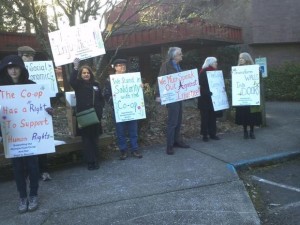

Judge Dismisses Lawsuit Filed Over Boycott of Israeli Goods
Last month, a judge in Olympia, Washington dismissed a lawsuit tailored to force the Olympia Food Co-op to rescind its boycott of Israeli goods. The judge ruled that the lawsuit brought by opponents of the boycott violated a Washington State law designed to prevent abusive lawsuits which are aimed at suppressing lawful public participation. Interestingly, an investigation by ElectronicIntifada had unearthed that the lawsuit against individuals with the Olympia Food Co-op Board was also planned in collusion with a national anti-Palestinian organization called StandWithUs that was working with the Israeli government. Lawyers with the Center for Constitutional Rights argued that the lawsuit qualified as a SLAPP, that stands for – – Strategic Litigation Against Public Participation. SLAPPs are lawsuits that target the constitutional rights of free speech and petition in connection with an issue of public concern.
Attorney Maria LaHood:
- The Olympia Food Co-op is a non-profit in Olympia Washington, that not only makes good food accessible to people, but also encourages economic and social justice in other ways.
- So it has a long history of doing social justice work, including adopting boycotts.
- The board decided to boycott Israeli goods in 2010 by consensus. A few months after that there was a co-op election. Three of the five plaintiffs who ended up bringing the lawsuit, members of the co-op, the co-op has about 22 thousand members. They ran for the election opposing the boycott and they lost.
- They ran for the board on an anti-boycott agenda and not voted in by the members.
- The board decided to boycott Israeli goods and divest from any Israel investment.
- One Israeli product: Gluten free ice cream cones,
- Obviously it had symbolic significance so that the five plaintiffs decided to send a letter to the board promising litigation that would be complicated, burdensome and expensive if the board didn’t end the boycott.
- CCR got involved and CCR cooperating council to represent the board members and decided to file an anti-SLAP motion as well as a motion to dismiss.
- Plaintiffs were also seeking discovery which of course they had promised. They started out serving 200 pages of discovery on all 16 defendants and trying to depose all 16 defendants. After we file the anti-SLAPP motion which actually stays discovery, they sought to depose three of the defendants as well as additional document requests.
- We challenged that discovery request.
- Olympia, Washington, is where Evergreen College and that’s also where Rachel Corrie is from.
- Stand With Us is basically an anti-BDS organization.
- The lawsuit against the co-op board members was actually identified by Stand With Us as one of its projects months before the case was even filed.
- Stand With Us also produced and posted online an anti-BDS video with four of the five plaintiffs in the case.
- They described themselves as an international organization ensuring Israel’s side of the story is told.
- They also have apparently connections as well to the Israeli government.
- The hearing was last Thursday, there was a great turn out, they had to move us to a bigger court room.
- The judge ruled that this lawsuit did challenge public participation so it did fall under the anti-SLAPP statute.
- Boycotts are constitutionally protected under the first amendment.
- This kind of suit is exactly what this statute was meant to address.
- We argued that the board under the bylaws has the authority to adopt any policy essentially it wants, that promotes the co-opts mission.
- He (the judge) did say that it was a nationally recognized movement.
- The victory here sends a message that you cannot sue to chill free speech issues.
Guest – Senior staff attorney Maria LaHood, who specializes in international human rights litigation, seeking to hold government officials and corporations accountable for torture, extrajudicial killings, and war crimes abroad. Her cases have included Arar v. Ashcroft, against U.S. officials for sending Canadian citizen Maher Arar to Syria where he was tortured and detained for a year; Al-Aulaqi v. Obama, to prevent the “targeted killing” of a U.S. citizen in violation of constitutional and international law; Matar v. Dichter, against an Israeli official responsible for a “targeted killing” that killed 15 Palestinians; Belhas v. Ya’alon, against a former Israeli official responsible for the 1996 shelling of a United Nations compound in Qana, Lebanon, that killed over 100 civilians; Corrie v. Caterpillar, on behalf of Palestinians killed and injured in home demolitions, and Rachel Corrie, a U.S. human rights defender who was killed trying to protect a home from being demolished; and Wiwa v. Royal Dutch/Shell, for the torture, detention and execution of Ken Saro-Wiwa and other human rights activists and protestors in Nigeria. After graduating from the University of Michigan Law School in 1995, Maria advocated on behalf of affordable housing and civil rights in the San Francisco Bay Area.
—————————————————————————–
Civil Liberties, Criminalizing Dissent, Guantanamo, Habeas Corpus, Human Rights, Political Prisoner, Surveillance, Targeting Muslims, Torture, Truth to Power
Podcast: Play in new window | Download
Updates:
- Michael Smith visits political prisoner David Gilbert and discusses David’s book Love and Struggle.
- Genocide Bill Angers Turks – It Was Genocide Radio Documentary by Heidi Boghosian
- Supreme Court: GPS Tracking Device Illegal
- Lizzy Ratner Co-hosts Beyond the Pale on WBAI
—
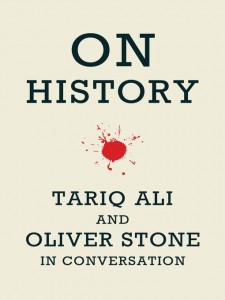
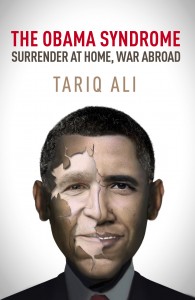
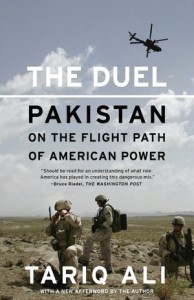
Tariq Ali: Turning Points in the History of Imperialism
Today we’re joined by internationally renowned writer and activist Tariq Ali. Tariq is visiting from London where he is editor of the New Left Review.
A writer and filmmaker, Tariq has written more than 2 dozen books on world history and politics, including The Duel: Pakistan on the Flight Path of American Power, The Obama Syndrome and On History. We talk specifically about several turning points in global history, the Occupy movement and US elections. .
Tariq Ali:
- The think the first World War was crucial but it wasn’t the war itself it was the consequences of that war. Here you had huge empires.
- The Russian revolution challenged capitalism frontally and its leaders said we want Europe to be with us, on our own we can’t do it. We need the Germans, we need a German revolution. That frightened the capitalist class globally.
- Woodrow Wilson, decided that the time had come to intervene. 22 countries came to intervene.
- This intervention made it impossible for the early infant Soviet Union to achieve what it wanted to achieve.
- The Second World War was an effort by the German ruling class to get its share of the world market in countries.
- The US helped rebuild Japan and Germany. They helped build France and Britain by the Marshal Plan and that has never been done by a big imperial power before.
- They managed to get the Soviet Union to implode by having an arms race. The Russians fell into their trap and decided to go for the arms race, had they not history might have been different.
- I hope the Chinese do not fall into the same trap, threatened by Obama’s puny little bases in Australia.
- People, early settlers in the United States got land totally free and they took it and that created the belief in the American psyche of private property.
- The Soviet Union imploded because the people lost faith in the system.
- The entire elite in the United States and Western Europe is wedded to the Washington consensus that emerged after the collapse of communism. The center piece of this consensus was a system which believed in market forces. I refer to it as market fundamentalism.
- We are confronting the extremism of the center and the result of this is no alternatives exist within mainstream politics. The effect that this is having is hollowing out democracy itself.
- Occupy: What we need is for these movements to call an assembly nationally and discuss a charter of demands for progressive America which need only be ten demands but something around which people can rally. I think its a movement that should be created bearing what the needs of ordinary people are.
- In order to understand the laws of motion of capital, you have to read Marx. It’s true capitalism has become much much more complex. Zombie capitalism, or fictitious capitalism, where money is used to make more money.
- It’s not money that’s creating productive goods.
- I had written a book on South American because I got very engaged in the Venezuela-Boliverian struggle and got to know Chavez very well.
- If Americans had access to Cuban medicine, the pharmaceutical companies would collapse, they would never let it happen.
Guest – Tariq Ali, writer, journalist and film-maker, born in Lahore and educated at Oxford University. He writes regularly for a range of publications including The Guardian and The London Review of Books. He has written more than a dozen books including non-fiction as well as scripts for both stage and screen.
———————————
Civil Liberties, Criminalizing Dissent, Habeas Corpus, Human Rights, Torture, Truth to Power
Podcast: Play in new window | Download
Updates:
- Heidi Boghosian: Mumia Abu-Jamal Update
- Support Mumia Here
- Michael Smith: Occupy Chicago Tribune Lawsuit Is On
- Michael Ratner: Tenth Anniversary of Guantanamo Prison: Cage Prisoners
- Movie: Death In Camp Delta
- Iranian Scientist Murdered: Mossad, CIA, ISI
- Covert War Against Iran
- Michael Ratner Speaks At Occupy London About Bradley Manning Case
- Julian Assange Extradition
- Judge Goes Forward With Investigation Of Guantanamo Torture Cases
- UK Transferring People To Qaddafi To Be Tortured
—
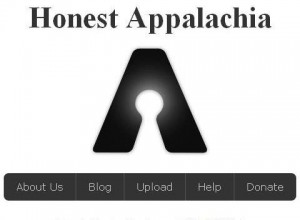
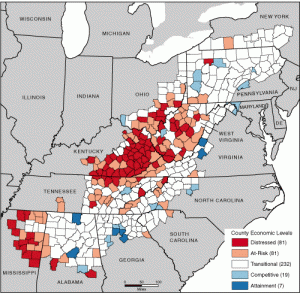
Newly Launched Whistle Blower Site – Honest Appalachia
Activists in Virginia have launched a website appealing to whistleblowers wanting to reveal evidence of corporate and government wrongdoing. The site is called honestappalachia.org, it uses a security technology to protect citizens who upload documents and it keeps their identity hidden if there’s legal action. Inspired by Wikileaks, honestapplachia is a low cost model that can be adapted by others worldwide.
Jimmy Tobias:
- The site is meant to be a resource for whistle blowers, that allows them to anonymously upload documents to our site. We will take those documents and vet them, and distribute them to journalists.
- SOPA is definitely a risk to transparency and whistle blower resources on the web.
- You go on our site, and you read our submission guide which is a step by step.
- The guide will tell you to download TOR. A simple piece of software which routes your activity through servers across the world, which essentially makes your activity anonymous.
- Your IP address basically gets lost in the crowd. We will never know who you are uploading to our site.
- We also encrypt the documents we receive.
- We have information on our site where others can take our open source software and use 80 percent of it.
- Our project is focusing outreach in Ohio, Pennsylvania, West Virginia, Kentucky, Tennessee, North Carolina, Virginia, also includes Georgia and South Carolina.
- We’re really hoping to receive documents about wrongdoing at the state and local level of government, from corporations in the region.
- Appalachia is a very industrialized region but its also very rural.
- We were funded with a grant from the Sunlight Foundation.
- Generally there’s a lot of cozy relationships in the states, between industry and government.
- We’re focusing on a broad array whether they’re coal or gas companies, banks, zoning boards, state and local governments, anything that could engage in corruption at the expense of the public.
Guest – Jim Tobias, activist and direct action protester.
—-
Civil Liberties, Guantanamo, Habeas Corpus, Human Rights, Political Prisoner, Surveillance, Targeting Muslims, Torture
Podcast: Play in new window | Download
Update:
- Michael Smith: Newt Gingrich Attacks Capitalism
—
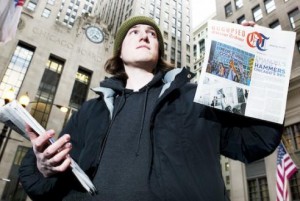
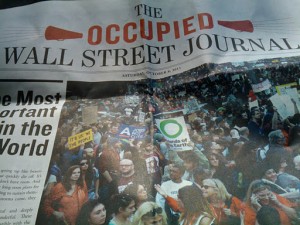
Occupy Wall Street Parody Papers Spark Legal Action From Big Newspapers
Occupy Wall Street Newspapers such as The Occupied Wall Street Journal or The Occupied Chicago Tribune have prompted lawyers to take Occupy protesters to court. In Chicago, a law firm is attempting to prevent the OWS movement from using The Occupied Chicago Tribune. We’re joined today by attorney Michael Deutsch with the People’s Law Office who has been involved with this issue in Chicago.
Attorney Michael Deutsch:
- The Chicago Tribune contacted some of the OWS people and threatened to shut down their website and facebook page and to go into federal court and sue them for trademark infringement.
- They said the word “Chicago Tribune” is a trademark that belongs solely to the Chicago Tribune and no one else can use it for any purpose or any way.
- Even if they do sue them I think the publicity not be good for the tribune and good for the occupy people.
- There is the Lanham Trademark Act that protects them from people appropriating them.
- There’s also this Dilution Act which prevents people from using or diluting their trademark by using it some unnecessary or dismissive way.
- When the people of Occupy were first contacted they were fearful of being sued by the Chicago Tribune.
- They offered to change it to the Occupy Chicago Times but they turned it down and said you can’t use any name that references a newspaper.
- With Peter Weiss’s help we realized this is a classic parody case, that’s basic First Amendment rights.
- The law isn’t that clear but the courts usually balance whether there will confusion of the name against First Amendment rights.
- In their masthead they’re now saying they’re not affiliated with the Chicago Tribune Corporation.
- Their website is still up, facebook is still up, they haven’t gone to court, so maybe they realize for us its a win / win situation.
- If we go to court we’re going to win on the legal grounds, plus we’re going to get a lot of publicity.
Guest – Attorney Michael Deutsch, partner with the Peoples Law Office.
—–
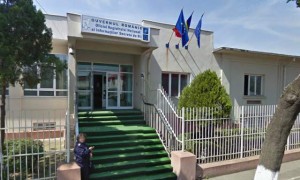
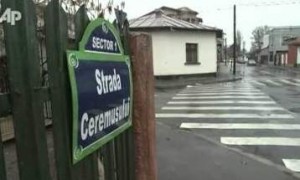
Inside the CIA Black Site in Bucharest
Reporters for German network ARD’s Panorama news magazine and the Associated Press have pieced together key details surrounding the CIA’s operation of a black site in Bucharest, Romania. AP’s Adam Goldman and Matt Apuzzo write:
In northern Bucharest, in a busy residential neighborhood minutes from the center of Romania’s capital city, is a secret that the Romanian government has tried for years to protect. For years, the CIA used a government building — codenamed Bright Light — as a makeshift prison for its most valuable detainees. There, it held Al-Qaida operatives Khalid Sheik Mohammad, the mastermind of 9/11, and others in a basement prison until 2006, the year some were sent to Guantánamo Bay, according to former U.S. intelligence officials familiar with the location and inner workings of the prison.
John Goetz:
- We’ve had a description of the CIA site, which is where one of the secret prisons were located.
- We had a description from some that worked there.
- The prison we’re talking about was used by the CIA in 2004 / 2005.
- The CIA secret prison was held in a Romanian government organization which gets called either ORNSS or NSA.
- It’s an organization that is used to get Romania up to speed on NATO classification rules.
- It’s a building that has a big NATO flag on top of it.
- In the back section of the building is where the secret prison was located.
- What I understand is that in Poland, when Bush came over, right after the beginning of the Iraq War.
- When they didn’t find weapons of mass destruction, he was there in May and early June 2003.
- We know that Al-Nashiri in his various times in CIA prisons, that his family members, I believe his mother was threatened with rape. He was water boarded, a drill was used on him.
- There was a mock execution, things like that. We’re not exactly sure what happened in Poland and Bucharest.
- There’s a little known site in Bosnia, that was used in days and weeks, right after 9-11.
- In Bagram, there’s a military prison there and there’s a CIA prison.
- I do know that in Africa there are prisons that run under a new model, where the state runs the prison and is quarterbacked, is the expression that’s used by the CIA who asks questions through others.
- It makes it easier to deny. Many people think . . .oh, the secret prison story is over.
- The facts are that outside of flight logs and some locations of prisons, no one really knows what happens inside these places.
- No one knows how they were run, no one knows perimeter security, how food was brought in, it remains a real black box in American history.
Guest – John Goetz, reporter with the German network ARD’s Panorama news magazine.
—–
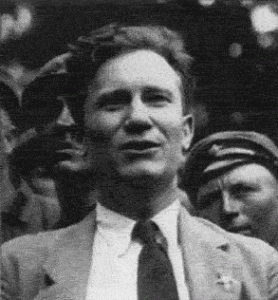
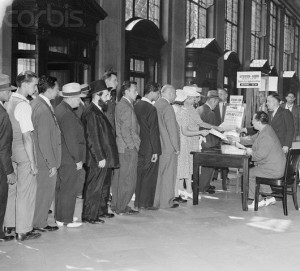
70th Anniversary of the First Smith Act Prosecution: Proto-Thought Crime Legislation
This year marks the 70th anniversary of the first Smith Act trial of revolutionaries accused of wanting to overthrow the government. The law was intended to destroy the 100,000-strong American Communist Party however, the Smith Act was first used against the much smaller, revolutionary rival to the Communist Party, the Socialist Workers Party. Our returning guest, author and activist Joe Allen writes about this 70th anniversary. The Alien Registration Act of 1940 is also known as the Smith Act after its sponsor Rep. Howard Smith of Virginia, a Democrat and leader of the anti-labor bloc in the House of Representatives. The Smith Act became the legal weapon against critics of the government and stipulates that:
Whoever organizes or helps or attempts to organize any society, group or assembly of persons who teach, advocate, or encourage the overthrow or destruction of any such government by force or violence; or becomes or is a member of, or affiliates with, any such society, group or assembly of persons, knowing the purposes thereof–
Shall be fined under this title or imprisoned not more than 20 years, or both, and shall be ineligible for employment by the United States or any department or agency thereof, for the five years next following his conviction.
Joe Allen:
- For many people in the United States, the defense of civil liberties, has always been an important and constant feature of our history and most of that time the defense of civil liberties has not been primarily against vigilantism, or rogue elements of the government or corrupt public officials. While that’s an important part of that, it has always been dealing with the actual laws that have been attempting to undermine civil liberties most of the time they’ve been federal laws.
- You can go back to the Alien Sedition Act of the Adams Administration, the Espionage Act of WWI. They were always used against opponents of the government and not spies as they were sold to people.
- James Canon was one of the most important figures in American Socialist history, his life traverse the history of the American far left.
- He began in the IWW. The radical militant trade union that organized the most oppressed sector of American workers.
- He was a founding member and later a national chair of the American Communist Party. Like many Wobblies and members of the Communist Party he was very concerned of the civil liberties of radicals and trade union organizers and was the head organizer of International Labor Defense in the 1920s.
- Canon developing a criticism of and his descent within the American Communist Party as the ILD moved away from its original mission and Canon himself to begin along with a number of significant figures of the American Communist Party and other people who sided with Trotsky in the dispute with Stalin over not only the Soviet Union also the International Communist Movement. He was the founder of early American Trotskyism in the 1920s and 1930s.
- It was the broad layer of people who were ultimately indicted under the Smith Act in 1941 primarily for advocating the overthrow of the United States government.
- Smith Act – Proto-Thought Crime Legislation
- It’s also in a sense a response to a dispute inside the labor movement.
- The first that a prosecutor tries to do is get a jury that is predisposed of the prosecution and not the defense.
- That’s one of the great travesties of the Smith Act, not only can you be indicted by the things you do but by the things you say.
- In that sense it really is a thought-control crime.
- The most important part of the Smith Act in this country is it effectively destroyed the left in this country during the late 1940s and the early 1950s.
Guest – Joe Allen, a frequent contributor to the International Socialist Review and a long-standing activist, based in Chicago.
——————————————




















